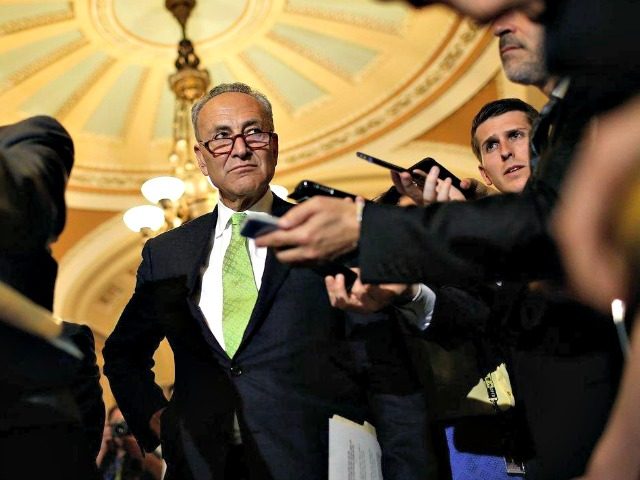Ten days before President-elect Donald J. Trump takes over the executive branch, his top cabinet nominees are scheduled to appear on Capitol Hill in front of the appropriate Senate committees before upper chamber votes on whether to confirm them for federal service.
“We hope the minority will treat President-elect Trump’s cabinet selections in the same way that we treated President Obama, and we confirmed a number on Inauguration Day itself,” said Senate Majority Leader Mitch McConnell (R.-Ky.), speaking to reporters Wednesday after a Capitol Hill meeting with Vice President-elect Michael R. Pence. “We hope to be in a position to do that once again.”
Although Republicans control the body, 52-to-46 with two Independents caucusing with Democrats, such a close margin sets up a dynamic whereby any three GOP senators have enormous leverage, with the ability to hand a victory to the Democrats.
The new leader of Senate Democrats, Sen. Charles E. Schumer (D.-N.Y.), is looking to confront the new president and the Republicans on many fronts, including eight Trump nominees, the vacancy on the Supreme Court, and the unwinding of President Barack Obama’s healthcare reform legislation, the 2010 Patient Protection and Affordable Care Act.
Schumer added in a statement to The Washington Post confirming his caucus’s plans:
Any attempt by Republicans to have a series of rushed, truncated hearings before Inauguration Day and before the Congress and public have adequate information on all of them is something Democrats will vehemently resist. If Republicans think they can quickly jam through a whole slate of nominees without a fair hearing process, they’re sorely mistaken.
The eight nominees targeted by Senate Democrats are: Steven Mnuchin, Treasury; Rep. Thomas Price (R.-Ga.), Health and Human Services; Sen. Jeff Sessions (R.-Ala.), Justice; Elizabeth DeVos, Education; Rex Tillerson, State; Rep. J. Michael “Mick” Mulvaney (R.-S.C.), Office of Management and Budget; Scott Pruitt, Environmental Protection Agency; and Andrew Puzder, Labor.
Of the eight targets, Senate Democrats will have the toughest time opposing Sessions on a personal level. Not only is the Alabama senator highly qualified as a former federal prosecutor and his own state’s attorney general, he is also personally popular with his colleagues — colleagues who loathe to vote against a fellow senator.
It is the custom for nominees for federal office to be “introduced” by the senators from their home state, who vouch for the nominee. Sessions is scheduled to be introduced by his Alabama partner Sen. Richard Shelby (R.-Ala.) and Sen. Susan Collins (R.-Maine). Collins is one of the three most liberal Republicans in the Senate and nearly always the one Republican voting with Democrats. Having Collins vouch for Sessions signals Democrats there will be no defections over Sessions.
It is expected to be smooth sailing for retired Marine Gen. James N. Mattis, Defense; Dr. Benjamin Carson, Housing and Urban Development; South Carolina Gov. Nikki Haley, U.S. Mission to the United Nations; retired Marine Gen. John F. Kelly, Homeland Security; Wilbur Ross, Commerce; and Elaine Chao, Transportation.
Mattis retired in 2013, after serving as the commanding general of U.S. Central Command, which oversees all of the Middle East and Egypt and is the next higher headquarters for theater commanders in Iraq and Afghanistan–two theaters, where Mattis led Marines in close combat, including the first battle for Fallujah.
Although Mattis enjoyed near-universal acclaim, his confirmation requires a legislative waiver to the National Security Act, which requires a seven-year gap between becoming secretary of defense and leaving uniformed service. The rule was put in place to guarantee civilian control of the military.
No one on Capitol Hill thought the waiver would be contested until Sen. John S. McCain III (R.-Ariz.) scheduled a hearing Monday for the Senate Armed Services Committee he chairs–focused on preserving civilian control of the military.
When Mattis’s nomination was announced, McCain was very supportive and said he would write the waiver legislation personally.
“He is without a doubt one of the finest military officers of his generation and an extraordinary leader who inspires a rare and special admiration of his troops,” he said. “General Mattis has a clear understanding of the many challenges facing the Department of Defense, the U.S. military, and our national security. America will be fortunate to have General Mattis in its service once again.”
That was then. Now the buzz on Capitol Hill is that unless Trump lines up with McCain to support the intelligence community and the intelligence community’s narrative that the Russians hacked the 2016 election, McCain will join Democrats in delaying conformations.
To their chagrin, Democrats made things easier for Trump and the Republicans — by making life easier for Obama. In 2011, they passed a law exempting 200 presidential appointments from Senate confirmation. Then, in 2013, Senate Democrats changed the chamber’s rules to remove the 60-vote threshold for ending debate on nominations other than for the Supreme Court.
Each Senate committee schedules hearings and votes on confirmations independently.
Tuesday Jan. 10
Sen. Jeff Sessions (R.-Ala.) before the Senate Judiciary Committee at 9:30 a.m.
Wednesday Jan. 11
Sen. Jeff Sessions (R.-Ala.) before the Senate Judiciary Committee at 9:30 a.m.
Elizabeth DeVos before the Senate Health, Education, Labor and Pensions Committee at 10 a.m.
Elaine Chao before the Senate Commerce, Science and Transportion Committee at 10:15 a.m.
John F. Kelly before the Senate Homeland Security and Governmental Affairs Committee at 2 p.m.
Tentative: Rex Tillerson before the Senate Foreign Relations Committee
Thursday Jan. 12
Wilbur Ross before the Senate Commerce, Science and Transportion Committee at 10 p.m.
The week beginning Jan. 16 Andrew Puzder is expected to testify before the Senate Health, Education, Labor and Pensions Committee.
Chao is married to McConnell and for reasons political or domestic, he said he will not recuse himself from voting for his wife.

COMMENTS
Please let us know if you're having issues with commenting.